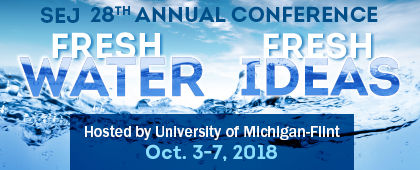By Jan Worth-Nelson
The 28th annual national convention of the Society of Environmental Journalists will open Wednesday at the University of Michigan-Flint’s Riverfront Center, with hundreds of reporters expected to be on hand for four days of talks, seminars, workshops, tours, and trying out the city’s night life.
 Built on the theme, “Fresh Water, Fresh Ideas,”the conference aims to bring concentrated attention to Flint and water issues nationally and worldwide.
Built on the theme, “Fresh Water, Fresh Ideas,”the conference aims to bring concentrated attention to Flint and water issues nationally and worldwide.
Freelance journalist and editor Jay Letto, SEJ director of annual conferences, said 500 journalists had registered for the conference by the end of the week; he expects up to 700 by the time the conference opens.
The event is being hosted by the University of Michigan – Flint. In a welcome letter to SEJ members, UM – Flint Chancellor Susan Borrego said the conference theme “resonates with our campus and community. While it has been several years since unsafe levels of lead were found in our drinking water” — a claim some water activists say cannot be trusted — “Flint and its residents are still dealing with the repercussions.”
The conference headquarters will be at the UM-Flint’s Riverfront Banquet Center, with many journalists bunking down in Riverfront’s dormitory-style rooms and others booking in many area hotels. In emails to potential conference registrants this week, SEJ officials said some local hotels “have been overwhelmed,” and listed Courtyard by Marriott and the Holiday Inn Gateway as two remaining options.
Many Flint community members–journalists, water activists, artists, and politicians– have been included in various ways in the agenda, which includes plenary sessions on the history of Flint and its water crisis, environmental rollbacks in the age of Trump, the future of the car, the future of news, and workshops on environmental racism, independent journalism, investigating scientific integrity, climate change, reducing waster, and many others.
In addition, on some days participants will fan out for tours of the city, kayaking the Flint River, and longer trips to Detroit and the Great Lakes.
Community members have been invited to several of the sessions, including a video story-telling workshop on Tuesday, Oct. 2; , a workshop on race and stereotypes in the news on Wednesday, Oct. 3; and a session called “Lessons from how the Flint Story Broke” on Saturday morning, Oct. 6. More information about attending the sessions along with the full conference agenda is available at sej.org.
Conference co-chair Emilia Askari, a journalist, educator and University of Michigan researcher, led a delegation to Flint in 2016 as the organization was deciding to bring the conference to Vehicle City. She underscored the role and importance of environmental journalism, particularly in light of crises like Flint’s.
 “In response to what has happened here in Flint, we are trying, collectively as a profession, to respond in a supportive way to the people of Flint in a collaborative and partnership kind of way,” she said.
“In response to what has happened here in Flint, we are trying, collectively as a profession, to respond in a supportive way to the people of Flint in a collaborative and partnership kind of way,” she said.
Brian Bienkowski, senior editor of environmental Health News and The Daily Climate, is the other conference co-chair.
Askari said environmental journalists “want to make sure that what happened here is not forgotten.”
Twenty-six years ago while a Detroit Free Press reporter, Askari helped found the SEJ, headquartered in Pennsylvania, which is now composed of more than 1400 members who cover environmental issues for the traditional news media.
According to Wikipedia, SEJ was started by reporters, editors, and producers working for The Philadelphia Inquirer, USA Today, Turner Broadcasting, Minnesota Public Radio, and National Geographic.
Today SEJ’s members are working in every type of news media in the United States, Canada, Mexico and 27 other countries.
EVM Editor Jan Worth-Nelson can be reached at janworth1118@gmail.com.


You must be logged in to post a comment.